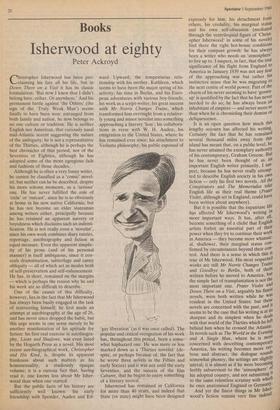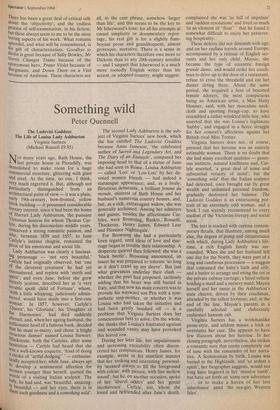Books
Isherwood at eighty
Peter Ackroyd
Christopher Isherwood has been pro- k.../claiming his fate all his life, but in Down There on a Visit it has its classic formulation: 'But now I knew that I didn't belong here, either. Or anywhere.' And his permanent battle against 'the Others' (the sign of the 'Truly Weak Man') seems finally to have been won: estranged from both family and nation, he now belongs to no one culture or tradition. He is neither English nor American, that curiously nasal mid-Atlantic accent suggesting the nature of the ambiguity; he is not a representative of the Thirties, although he is perhaps the best chronicler of that period, nor of the Seventies or Eighties, although he has adopted some of the more egregious fads and fashions of those decades.
Although he is often a very funny writer, he cannot be classified as a 'comic' novel- ist; but neither can he be described, despite his more solemn moments, as a 'serious' one. He has never fulfilled the role of 'exile' or 'outcast', since he is so obviously at home in his now native California; but he has not become an elder statesman among writers either, principally because he has retained an apparent naivety or boyishness which disclaims such an indenti- fication. He is not really even a 'novelist', since his own work combines diary entries, reportage, autobiography and fiction in equal measure. Even the apparent simplic- ity of his prose (and of his personal manner) is itself ambiguous, since it con- ceals dramatisation, subterfuge and canny obliquity — all of which act as modes both of self-preservation and self-enhancement. He has, in short, remained on the margins — which is perhaps the reason why he and his work are so difficult to describe.
One of the causes of this difficulty, however, lies in the fact that Mr Isherwood has always been busily engaged in the task of reinventing himself; he first made an attempt at autobiography at the age of 26, and has never since dropped the habit, but this urge seems in one sense merely to be another manifestation of his aptitude for fiction: his first real exercise in autobiogra- phy, Lions and Shadows, was even listed by the Hogarth Press as a novel. His most recent autobiographical work, Christopher and His Kind, is, despite its apparent frankness about such matters as his homosexuality, a studiously opaque volume; it is a curious fact that, having read it, one knows less about Mr Isher- wood than when one started.
But the public facts of his history are sufficiently well known: his early friendship with Spender, Auden and Ed- ward Upward; the tempestuous rela- tionship with his mother, Kathleen, which seems to have been the major spring of his activity; his time in Berlin, and his Euro- pean adventures with various boy-friends; his work as a script-writer; his great success with Mr Norris Changes Trains, which transformed him overnight from a relative- ly young and minor novelist into something approaching a literary lion'; his collabora- tions in verse with W. H. Auden; his emigration to the United States, where he has remained ever since; his attachment to Vedanta philosophy; his public espousal of 'gay liberation' (as it was once called). The popular and critical recognition of his work has, throughout this period, been a some- what haphazard one. He was more or less marked down as a 'Thirties novelist' (de- spite, or perhaps because of, the fact that he wrote three novels in the Fifties and early Sixties) and it was not until the early Seventies, and the success of the film Cabaret, that he began to enjoy something of a literary revival.
Isherwood has remained in California for more than 40 years, and indeed that State (or state) might have been designed expressly for him: his detachment from others, his credulity, his marginal status and his own self-obsession (mediated through the ventriloquial figure of 'Christ- opher Isherwood' in some of his novels) find there the right hot-house conditions for their rampant growth: he has always been a writer who needs an 'atmosphere' to live up to. I suspect, in fact, that the true significance of his flight from England to America in January 1939 was not any fear of the approaching war but rather his instinctive sense that he was migrating to the next centre of world power. Part of the charm of his never seeming to have 'grown- up' is qualified by the fact that he has never needed to do so; he has always been an inhabitant of empires — and never more so than when he is chronicling their demise or deliquescence. It is an open question how much this lengthy sojourn has affected his writing. Certainly the fact that he has remained several thousand miles away from this island has meant that, on a public level, he has never attained the exemplary authority of his contemporary, Graham Greene. But he has never been thought of as an important English writer primarily, I sus- pect, because he has never really attemp- ted to describe English society in his oWn fiction — only his first two novels, All the Conspirators and The Memorialist take English life as their real theme (Prater Violet, although set in England, could have been written about anywhere). But it is possible that the expatriate life has affected Mr Ishenvood's writing in more important ways. It has, after ally become something of a cliché that English artists forfeit an essential part of their power when they try to continue their work in America — they become more whimsic- al, shallower, their marginal status con- firmed by circumstances beyond their con- trol. And there is a sense in which this is true of Mr Isherwood. His most respected works are still Mr Norris Changes Trains and Goodbye to Berlin, both of them written before he moved to America, but the simple fact of transplantation is not the most important one. Prater Violet and Down There on a Visit, arguably his finest novels, were both written while he was resident in the United States: but these novels are concerned with the past, and it seems to be the case that his writing is at itS sharpest and its simplest when he deals with that world of the Thirties which he left behind him when he crossed the Atlantic. In novels such as The World in the Evening and A Single Man, where he is most concerned with describing contemporarY America, his writing becomes more ver- bose and abstract; the dialogue sounds somewhat phoney; the settings are slighdY unreal; it is almost as if he were becoming, feebly subservient to the 'atmosphere' 01 his adopted country, and not submitting it to the same relentless scrutiny with winch he once anatomised England or GermanY. And yet the finest things in Mr Isher- wood's fiction remain very fine indeed. There has been a great deaf of critical talk about the 'objectivity', and the endless Process of self-examination, in his fiction; but these always seem to me to be the most boring aspects of his work. What remains splendid, and what will be remembered, is his gift of characterisation. Goodbye to Berlin is great because of Sally Bowles, Mr Norris Changes Trains because of the eponymous hero, Prater Violet because of Bergmann, and Down There on a Visit because of Ambrose. These characters are
all, in the cant phrase, somehow 'larger than life', and this seems to be the key to Mr Isherwood's tone: for all his attempts at casual simplicity or documentary repor- tage, his real gift is for a slightly flam- boyant prose and grandiloquent, almost grotesque, narrative. There is a sense in which his characters therefore owe more to Dickens than to any 20th-century novelist — and I suspect that Isherwood is a much more rootedly English writer than his accent, or adopted country, might suggest.











































 Previous page
Previous page